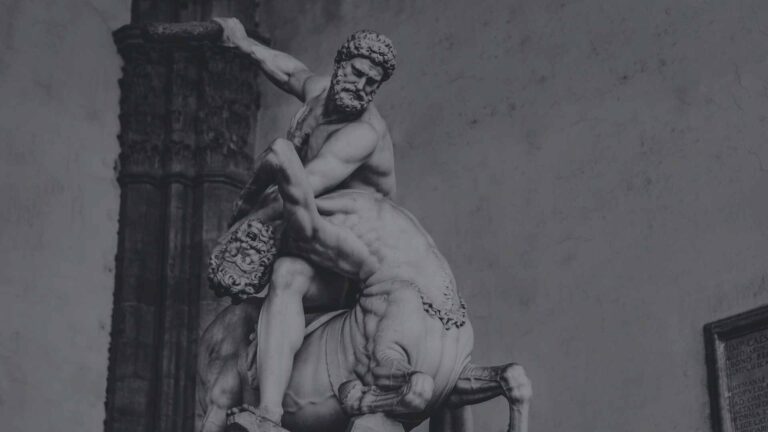Aristotle was an ancient Greek philosopher who lived from 384–322 BCE.
Born in Stagira, a small town in northern Greece, Aristotle found his way to Athens as a young man, where he would become a disciple of the legendary philosopher Plato, studying at the Platonic Academy in Athens.
Under Plato’s guidance, Aristotle developed his skills as a thinker and a writer. As he developed his own ways of seeing the world, he would ultimately break free from the Platonic mould, forging his own path and leaving a strong mark on the history of western philosophy.
His works on logic, metaphysics, epistemology, and natural philosophy have influenced western thinking for thousands of years, and his written works, including Nicomachean Ethics, Organon, and On the Heavens are some of the best-known philosophical works from the ancient world.
Here is a list of 30 quotations from Aristotle from his surviving works.
While the passages are short, they contain a wide range of helpful ideas to guide us in different areas of life.
Aristotle Quotes:
He who is unable to live in society, or who has no need because he is sufficient for himself, must be either a beast or a god.
The self-indulgent man craves for all pleasant things, and is led by his appetite to choose these at the cost of everything else.
Virtue lies in our power, and similarly so does vice; because where it is in our power to act, it is also in our power not to act…
Happiness, whether consisting in pleasure or virtue, or both, is more often found with those who are highly cultivated in their minds and in their character, and have only a moderate share of external goods, than among those who possess external goods to a useless extent but are deficient in higher qualities.
Man, when perfected, is the best of animals, but when separated from law and justice, he is the worst of all.
Moral virtue is the quality of acting in the best way in relation to pleasures and pains, and that vice is the opposite.
I count him braver who overcomes his desires than he who conquers his enemies, for the hardest victory is over self.
Some thinkers hold that it is by nature that people become good, others that it is by habit, and others that it is by instruction. . . just as a piece of land has to be prepared beforehand if it is to nourish the seed, so the mind of the pupil has to be prepared in its habits if it is to enjoy and dislike the right things.
It is the mark of an educated mind to be able to entertain a thought without accepting it.
It is of the nature of desire not to be satisfied, and most men live only for the gratification of it.
If things do not turn out as we wish, we should wish for them as they turn out.
It is well said, then, that it is by doing just acts that the just man is produced, and by doing temperate acts the temperate man; without doing these no one would have even a prospect of becoming good.
The life of money-making is one undertaken under compulsion, and wealth is evidently not the good we are seeking; for it is merely useful and for the sake of something else.
Teachers should be more honoured than parents, for whereas parents give their children life, teachers give their children a good life.
Bad people are in conflict with themselves; they desire one thing and will another, like the incontinent who chooses harmful pleasures instead of what they themselves believe to be good.
One swallow does not make a summer, neither does one fine day; similarly one day or brief time of happiness does not make a person entirely happy.
It is also in the interests of a tyrant to make his subjects poor, so that he may be able to afford the cost of his bodyguard, while the people are so occupied with their daily tasks that they have no time for plotting.
Even when laws have been written down, they ought not always to remain unaltered.
The truly good and wise man will bear all kinds of fortune in a seemly way, and will always act in the noblest manner that the circumstances allow.
Rash men wish for dangers beforehand but draw back when they are in them. Brave men are excited at the moment of action, but collected beforehand.
The man who shuns and fears everything and stands up to nothing becomes a coward; the man who is afraid of nothing at all, but marches up to every danger becomes foolhardy. Similarly the man who indulges in pleasure and refrains from none becomes unrestrained; but if a man behaves like a bad-mannered and turns his back on every pleasure, he is a case of insensibility. Thus temperance and courage are destroyed by excess and deficiency and preserved by the mean.
It is absurd to hold that a man ought to be ashamed of being unable to defend himself with his limbs but not of being unable to defend himself with reason when the use of reason is more distinctive of a human being than the use of his limbs.
The happy life is thought to be one of excellence; now an excellent life requires exertion, and does not consist in amusement.
With the truth, all given facts harmonise; but with what is false, the truth soon hits a wrong note.
The young have exalted notions, because they have not been humbled by life or learned its necessary limitations; moreover, their hopeful disposition makes them think themselves equal to great things, and that means having exalted notions. They would always rather do noble deeds than useful ones: Their lives are regulated more by moral feeling than by reasoning. All their mistakes are due to excess and vehemence and their neglect of the maxim, “Never go to extremes”. They overdo everything; they love too much, hate too much, and the same with everything else. And they think they know everything, and confidently affirm it, and this is the cause of their excess in everything.
The pleasures arising from thinking and learning will make us think and learn all the more.
Education is bitter, but its fruit is sweet.
All knowledge should be subject to examination and reason.
Man is a political being.
We are what we do repeatedly. Excellence, then, is a habit, not an action.
An educated mind is able to entertain a thought critically, without accepting it.
Educating the mind without educating the heart is no education at all.
Poverty begets revolution and crime.
It is best to rise from life as from a banquet, neither thirsty nor drunken.
The secret of business is to know something that nobody else knows.
To be a good leader you must be a good follower.
All people by nature desire knowledge.
Love is a single soul inhabiting in two bodies.
Best friend is the person who wishes you well for your sake.
Virtue consists more in doing good than refraining from evil.
People acquire a particular quality by constantly acting according to it.
Happiness depends upon ourselves.
The educated differ from the uneducated as much as the living differ from the dead.
You will achieve nothing in this world without courage.
The worst form of inequality is to try to make unequal things that are equal.
All great geniuses have a touch of madness.
The sign of thorough knowledge is the ability to teach.
Man is the noblest of all animals. Separate him from law and justice and he is the worst.
Good habits formed at youth make all the difference.
The value of life lies in the power of contemplation and not mere survival.







